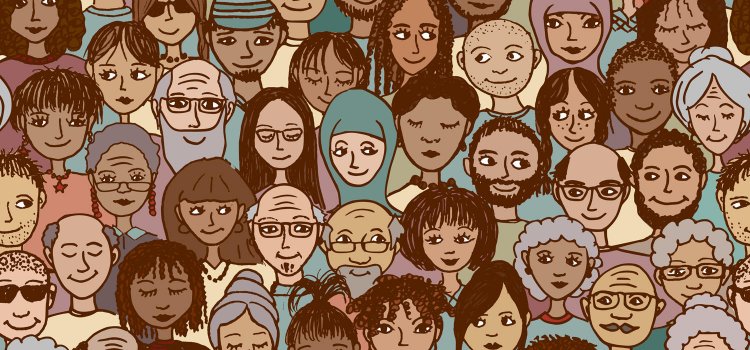Friendship and Inclusivity

The importance of friendship in our lives cannot be underestimated.
However, our busy and often complex lives leave little time or energy for developing relationships that are integral to a nurturing society. Many people, who do not necessarily meet the ‘made up, superficial’ standards of the society often have to be so concerned about meeting their basic needs that they can devote little time to relationships.
This in turn, makes them exposed to the risk of experiencing social isolation and alienation and social anxiety and depression!
‘Inclusion is the Key’!
With such mindset, it can impede the development of meaningful friendships. The opportunity to have real friends occurs through participation in family, school, neighbourhoods, and other places where people gather.
Another very important concept about friendship that people seem to assume wrongly is that most of them need not to happen naturally. It requires effort and initiation. Discovering and building real friendships often requires intentional or deliberate action.
We need to sow the seeds or the idea of inclusivity in young minds so they are more open to making friends with people from all walks of life, not hesitating to form relationships with people who are different from them.
Social exclusion can impact everything from emotional well-being to academic achievements and continues to stay with the person with the rest of their lives.
When kids exclude others, this is a form of bullying known as relational aggression or social bullying. This term refers to the use of social networks, either in the real world or online, to be hurtful to someone. Exclusion is one of the tactics relational bullies use.
During early adolescence, children’s relationships with their peers play an important role in their personal development. Friendships build self-esteem, provide motivation, and support academic achievement. Children who are perceived as different, however, often struggle to make friends and find themselves left out of social groups. This exclusion might be based on dissimilarities in such areas as cultural background, interests, or social class.
In a highly competitive academic environment, for example, children who struggle with learning are frequently excluded by their better-performing peers, making friendships across these two groups less likely to occur.
A recent study that focused on the interactions between higher- and lower-achieving students shows why this needs to change, and how schools can encourage friendships between children who differ in their level of academic achievement.
Inclusive Mindset
Carol Dweck, a Stanford University psychologist, coined the terms fixed and growth mindset. She was curious why some individuals were successful at achieving their goals while others fell short. After decades of research and observing the attitudes and behaviours of several students, Dweck came to a conclusion. It was all about an individual's mindset.
Dweck quoted how, “growth mindset people believe that their most basic abilities can be developed through dedication and hard work. This view creates a love of learning and a resilience that is essential for great accomplishment. Virtually all great people have had these qualities.”
She goes onto to describe how fixed mindset people, “believe their basic qualities, like their intelligence or talent, are simply fixed traits. They also believe that talent alone creates success without effort. They’re wrong.”
Johnny C. Taylor. Jr., president of the Society for Human Resource Management said, “We often forget the ‘i’ in the diversity and inclusion conversation. The challenge is in having a culture where all employees feel included.”
Inclusion shouldn’t be confined to a specific day or month. Instead, fostered it into our daily lives. To understand inclusion, we need to understand and get to the root of unconscious biases and issues that professionals face.
So, how do we do that?
Well, it starts with you and shifting your fixed mindset to a growth mindset.
Author Scott Peck describes how unhealthy groups can create a sense of purpose and value for themselves by choosing an individual to be a common enemy in his book:
‘The Different Drum: Community Making and Peace’.
What he is referring to is when a group of mean girls or bullies builds their identity by keeping an individual out and attacking this person’s reputation and value. They also develop a sense of connectedness despite the fact that they are being mean.
Sometimes, the group will make fun of the person, engage in name-calling and leave the person off of invitation lists. They also may take bullying online and engage in cyberbullying, shaming, and sub tweeting. At other times, the group may act like the person does not exist. Usually, one person in the group leads the shaming and ostracizing and pressures others to bully as well. Consequently, the members of the group either participate or say nothing when the mean behaviour occurs.
To make matters worse, adults rarely take relational aggression between children and teens seriously. They make suggestions like, “Just ignore them and play with someone else.” But minimizing the pain of exclusion is never a good idea. Just remember that all kids, regardless of age, benefit from having the adults in their lives listen to and validate their feelings.
Not only do kids internalize the message from their peers that they are “losers,” but they also may act in self-destructive ways. In fact, some kids become depressed or even contemplate suicide. Meanwhile, others become bitter and look for ways to get revenge. Without support, a child may start to believe that everyone important in the world thinks she has no value or worth.
Of course one of the best ways to help combat exclusion is to teach kids from an early age how to inclusive (as said earlier).
Check your own diversity deficits
Remember kids watch and listen to everything you do. Examine your neighbourhood, your community, your friendships and your interactions with others. Then be honest with yourself. How often does your family interact with people who are not like you? For instance, do you have friends that are different races and religions? Are you accepting of people? Or do you make judgments and maintain stereotypes? If you want your kids to be inclusive, you need to be that way too.
Support individuality
Encourage your child to value not only herself as a unique and worthwhile person but others as well. Remind her that a person’s appearance, personality, quirks, beliefs, and interests bring something special to the world that nobody else can duplicate. If your child recognizes that everyone has something to offer, she will be less likely to socially reject others.
Reject in-crowd ideas
Be sure your child realizes that the “in-crowd” does not always translate to the “best crowd.” Instead, focus her attention on right values including kindness, respect, and empathy. And teach her what constitutes a healthy friendship. Also, as a parent resist the urge to invest in all the latest electronics, gadgets, clothes, shoes and cars. These items will not buy acceptance for your child. If you take your child’s focus off of material items as a means to acceptance, then she will be less likely to judge others on their material items as well.
Teach your child to reach out to others
Urge her to make other kids in her class feel valued. Encourage her to call the new kid in class or get to know the girl who often sits alone at lunch. One way to make sure this is happening is to challenge your child to find out one good thing about a child she regularly says is annoying. Challenging her to do this will teach her that it is good in everyone and that everyone has something to offer the world.
Get your child look to the future
Sometimes the values, abilities, and strengths that are admired in middle school are not the same attributes that are admired later in college. For instance, the highly intelligent boy who is awkward in middle school may go on to be a brilliant doctor someday. The goal is that your child sees that even kids who are not popular are worth investing time in.
Ask professionals
Teachers, counsellors, and principals are usually able to identify a child whose friendship your child can cultivate, especially if your child seems to attract toxic friends or frenemies. Be sure to check in with the teachers and administrators at your child’s school for ideas on other friendships or groups. Cliques can be extremely unhealthy and you should encourage your child to avoid becoming a part of a clique.
Empower your child
While it is important that your child attempt to include everyone, you also need to let her know that she is allowed to feel safe and valued in a friendship. Your child does not have to accept being physically or emotionally attacked by a child in the interest of being inclusive. What’s more, if the relationship has proven to be hurtful and toxic, it is absolutely acceptable for your child to establish boundaries with the person.
It is even acceptable to establish boundaries with kids that have special needs. Just because a child has a disability does not give him the right to hurt your child physically or emotionally. Nor should your child feel like she always has to do what the other child wants if it is not a mutual choice.
Peer pressure is a powerful thing. But so is standing up for other kids.
Research shows that when one person takes a stand against bullying, it stops. When your child sees another child being excluded encourage her to take a stand.
These tiny steps actually go on and truly make a huge difference in other people’s lives.
Real friendships are genuine caring relationships where people share common interests, love and respect each other, and want to spend time together.
This Friendship Day, pledge to Inclusivity. It is the new cool!















































